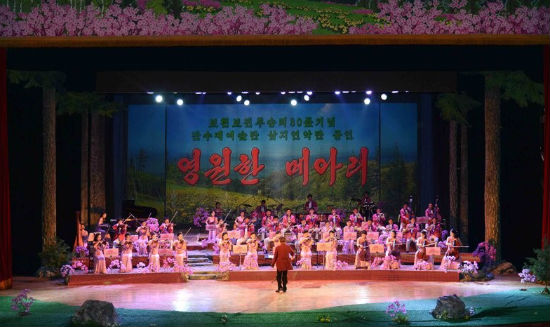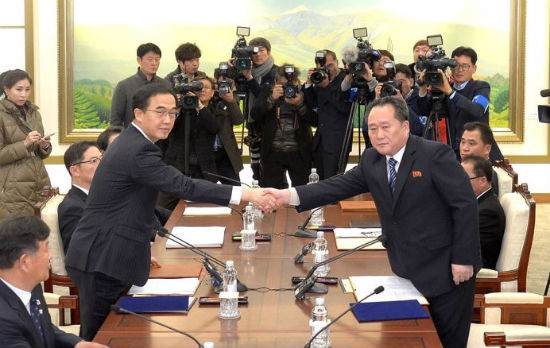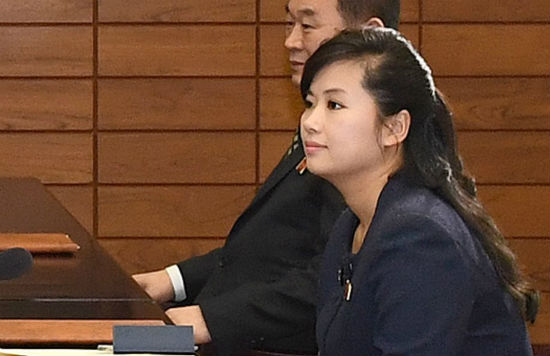Talks over the Pyeongchang Olympics continue between North and South Korea this week, and an agreement for the North to send 140-members of the Samjiyon Orchestra members to the games was reached on January 15. This has sparked interest in the reason for the group’s attendance at the Olympics.
While the Samjiyon Band of the Mansudae Art Troupe has previously appeared in North Korean state media, this week’s agreement marks the first introduction of a group by the name of the “Samjiyon Orchestra.”
Appearing in 2009, the Samjiyon Band consisted of 50 members playing orchestral music, percussion, singing, and other instrumental music. The group appeared numerous times, including during the 2017 New Year’s celebrations. This band may have formed the basis for the new, larger Samjiyon Orchestra.
Considering that a typical orchestra comprises 80-90 members and that the North’s orchestra was announced to comprise 140 members, analysts are considering that the group may be a combination of orchestra members and other art troupe members. These may include the Moranbong Band, Chongbong Band, and others.
Daily NK spoke with Jang Mi Yeon (alias; defected in 2015) on January 16, who graduated from the performing arts school system in Pyongsong. Jang said, “Many beautiful ‘princess-like’ girls appeared in the Samjiyon Band, but typically you hear of them moving up to the Moranbong Band or Unhasu Orchestra. So I was surprised to hear that this new group, the ‘Samjiyon Orchestra,’ would be appearing at the Olympics. I am not sure why they are using this name, but it seems like they are borrowing the name for the occasion.”
Performers coming up through the arts program in North Korea had in the past considered the Samjiyon Band to be more sophisticated than the military uniform-wearing Moranbong Band. But since Kim Jong Un came to power and began heavily promoting the Moranbong band, the Samjiyon Band has fallen into relative obscurity.
“It would have been fair to call the Samjiyon Band an orchestra because the band did include cellos, violins, and other orchestral instruments. North Korea has a history of altering groups for international performances, so it seems that they are picking members from the Moranbong Band, Unhasu Orchestra, and other groups to form what they are calling the Samjiyon Orchestra,” Jang continued.
When the North Korean side mentioned the Samjiyon Orchestra at the working-level talks, they did not provide any further details about the group. The South Korean side is now seeking elaboration as to the makeup of the group. A South Korean Ministry of Unification spokesperson said, “It seems that it’s a variation of the Samjiyon Band created under Kim Jong Il, but we need further explanation as to how this Samjiyon Orchestra is different from the band.”
After North Korea signaled during the January 9 high-level talks its intention to send a group of performers to the Pyeongchang Olympics, many assumed the Moranbong Band – formed under Kim Jong Un in 2012 – would be part of this group. Their participation then seemed certain when Moranbong Band leader Hyon Song Wol joined the North Korean delegation in working-level talks days later.
But contrary to expectations, North Korea announced the participation of the Samjiyon Orchestra instead of their “national treasure” Moranbong Band. One possible reason for this could be an attempt by North Korea to dispel international worries over intentions to use the Moranbong Band for propaganda purposes at the Olympics. However, the word “Samjiyon” is also a highly symbolic word emphasized in domestic propaganda and used to promote the “Mt. Paektu bloodline” of the Kim family dynasty.
Often referred to as a ‘sacred site of the revolution,’ the town of Samjiyon in Ryanggang Province was first promoted under Kim Il Sung as an important battle site during his fight against the Japanese and later designated as the birthplace of Kim Jong Il. Now, Kim Jong Un has been using the symbolic title “Samjiyon” as a cult-of-personality propaganda tool to reinforce his image as part of the “sacred Kim family Mt. Paektu bloodline.” Kim Jong Un has made multiple official visits to the town and the name has also been used as the title for mass mobilization ‘battles.’
“Every time Kim Jong Un is faced with a weighty decision, he allegedly travels up to Samjiyon near Mt. Paektu. He has been working on improving the branding of Samjiyon as an important battlefield and for the ‘sacred Mt. Paektu bloodline,’ and he plans to use these to his advantage in sending [the Samjiyon Orchestra] to the Olympics,” said Dr. Ahn Chan Il, President of the World Institute for North Korean Studies.
North Korea may see an opportunity to take advantage of the atmosphere of goodwill coming from the international community’s emphasis on the Olympics as a peaceful event. Its ultimate goal in this regard is to soften international opinion on the way towards lifting international sanctions that have been considerably damaging to the North.
Analysts have also said that the North will try to shed its reclusive’ reputation through its Olympics appearance and utilize music groups such as the Samjiyon Orchestra as a possible window to foreign currency earning opportunities. Instead of being a temporary music group formed specifically for the Olympics, Kim Jong Un may want to create the impression that the group is capable of performing anywhere in the world for other occasions.
“The North is trying to promote a peaceful image through its active engagement with the South on this event, and they will use the event as an opportunity to knock on the door of the international community. Just as admission prices to see the Moranbong Band were raised to thousands of dollars for past international performances, they will surely try to make money from the Samjiyon Orchestra’s performances,” said Dr. Ahn.
It is not yet clear who will lead the Samjiyon Orchestra in its Olympics appearance, although it appears likely that Hyon Song Wol will lead the group.
As such, experts in South Korea are calling for full cooperation and a thorough accounting of the identity and rank of the person the North chooses as the orchestra’s leader. The South Korean Ministry of Unification spokesperson said that the North “has not yet confirmed the qualifications of Hyon Song Wol as head of the Samjiyon Orchestra, but we expect them to provide this information as the talks progress.”























